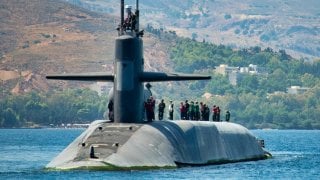Kamala Harris Faces A Problem: America Must Live with a Nuclear North Korea
Only from a position of strength would a policy of limited diplomatic engagement with Pyongyang be credible. But such diplomatic engagement must be bound by the reality that North Korea won’t accept complete and verifiable nuclear disarmament. The U.S. will have to live with a nuclear North Korea.
If Vice President Kamala Harris wins the presidential election on Nov. 5 and is sworn in as president on Jan. 20, 2025, her administration will face the serious national security challenge of dealing with an unpredictable, nuclear-armed North Korea.
Continuing the Biden administration’s policy of strategic patience is a path to policy failure. The approach has not stopped Pyongyang from rapidly expanding and modernizing its nuclear arsenal, including by building tactical nuclear weapons that could be employed coercively against South Korea and other U.S. allies.
A failure of U.S. influence to constrain North Korea’s nuclear ambitions has generated growing concern in Seoul about the efficacy of U.S. nuclear deterrence. There is now an active debate in South Korea about acquiring its own nuclear weapons in response to the rapid North Korean nuclear buildup – or at the very least, reaching a nuclear sharing arrangement that could see the return of some U.S. nuclear forces to the Korean Peninsula.
Continuing Biden’s strategic patience under a Harris administration could result in a proliferation cascade throughout the Indo-Pacific, potentially extending even into South Asia.
The Dilemma Facing A Harris Administration: North Korea's Nukes
Instead, the next administration must strengthen deterrence at all levels and visibly communicate this step to Pyongyang. The U.S. needs to break out of the policy trap that is strategic patience.
If she becomes president, Harris must reassure both South Korea and Japan that the security guarantees offered by extended U.S. nuclear deterrence remain credible and strong. This must be backed up by visible changes to U.S. military force posture. Congressional calls for reintroducing the nuclear-armed Sea-Launched Cruise Missile (SLCM-N) need to be supported by an incoming administration as part of the next U.S. Nuclear Posture Review.
SLCM-N, which was initially planned for use on Virginia-class nuclear submarines (SSN) and future SSN-X submarines, gives U.S. nuclear forces greater flexibility. It would show the U.S. has more options in responding to a North Korean nuclear threat than to either back down or escalate toward strategic nuclear weapons.
It seems highly likely that the New START Treaty will end in 2026 absent a Russian willingness to renew it.
Given the modernization of Russian nuclear forces and the modernization and expansion of Chinese nuclear forces, the U.S. is likely to be facing a much more adverse nuclear threat environment. A Harris administration should not risk Seoul choosing to acquire its nuclear weapons as a result of continuing Biden’s strategic patience.
At the conventional military level, the next administration should reinforce the U.S.-South Korea Mutual Security Treaty as part of strengthening integrated deterrence. The U.S. could enhance integrated air and missile defense on and around the Korean peninsula such that boost-phase intercept becomes a possibility.
Pillar II of the AUKUS treaty also opens up the possibility of collaboration with South Korea and Japan on technology able to counter hypersonic missile threats from North Korea, China, and Russia.
From a position of strengthened deterrence, greater diplomatic engagement with allies and partners would complement steps in military force posture to reinforce unity in the region. The message sent would be a strong signal to Beijing, Moscow, and Pyongyang that nuclear threats are unacceptable.
Only from a position of strength would a policy of limited diplomatic engagement with Pyongyang be credible. But such diplomatic engagement must be bound by the reality that North Korea won’t accept complete and verifiable nuclear disarmament. The U.S. will have to live with a nuclear North Korea. Being strategically patient for some change of heart from Pyongyang is a path to failure. A Harris administration would need to prioritize strong deterrence with Kim Jong Un.
About the Author: Malcolm Davis
Malcolm Davis is a Senior Analyst at the Australian Strategic Policy Institute. Before this, he was a Post-Doctoral Research Fellow in China-Western Relations at Bond University and served in the Australian Department of Defence. You can follow him on Twitter at@Dr_M_Davis.
Image Credit: Creative Commons and/or Shutterstock.

